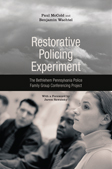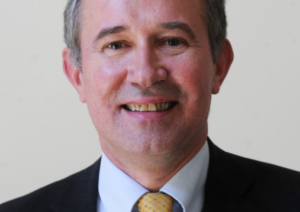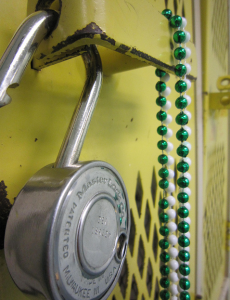News & Announcements
 Wipf & Stock Publishers have just republished "The Bethlehem Pennsylvania Police Family Group Conferencing Project" by IIRP founding professor Paul McCold, now adjunct professor at Simon Fraser University School of Criminology, and IIRP director of technology Benjamin Wachtel. Reissued with the title Restorative Policing Experiment, the volume takes its place Wipf & Stock's new Restorative Justice Classics series. The book announcement says:
Wipf & Stock Publishers have just republished "The Bethlehem Pennsylvania Police Family Group Conferencing Project" by IIRP founding professor Paul McCold, now adjunct professor at Simon Fraser University School of Criminology, and IIRP director of technology Benjamin Wachtel. Reissued with the title Restorative Policing Experiment, the volume takes its place Wipf & Stock's new Restorative Justice Classics series. The book announcement says:
The Bethlehem Police Family Group Conferencing Experiment was the first randomized trial of restorative justice in the United States. Moderately serious juvenile offenses were randomly assigned either to court or to a diversionary "restorative policing" process called family group conferencing. Police-based family group conferencing used trained police officers to facilitate a meeting attended by juvenile offenders, their victims, and their respective family and friends. This group would discuss the harm caused by the offender's actions and develop an agreement to repair the harm.
This announcement comes from the Correction Services of Canada:
The theme for Restorative Justice Week 2012, which will be held November 18-25, 2012, is “Diverse Needs; Unique Responses”. This theme recognizes that restorative justice is an approach that addresses the various needs of people impacted by crime and conflict that are created when a person has been harmed or treated unfairly. Restorative justice processes, in response to crime and conflict, are highly adaptable to different people, environments, and systems as the identified needs of the people involved help formulate the unique response that can contribute to a person’s sense of safety, justice and well-being. Read our introduction letter for more information on this year’s theme.
 A recent piece in EdWeek by Sarah Sparks discusses brain research that demonstrates the devastating long-term effects of childhood adversity.
A recent piece in EdWeek by Sarah Sparks discusses brain research that demonstrates the devastating long-term effects of childhood adversity.
The IIRP is offering professional development to deal with this issue, in events titled "Restorative Responses to Grief, Trauma and Adversity." Upcoming locations include the Denver area, New York City and Bethlehem, Pennsylvania.
Here are some selections from that article:
While educators and psychologists have said for decades that the effects of poverty interfere with students' academic achievement, new evidence from cognitive and neuroscience is showing exactly how adversity in childhood damages students' long-term learning and health.
 Photo by Mike Fisher at Flickr Creative Commons - The photographer notes in his comment: "The juxtaposition of the flag with this sculpture of an Indian made me think of Black Kettle, who was a Southern Cheyenne Indian chief. Black Kettle's people were camped on the Sand Creek Reservation in southeast Colorado in 1864 when a group of Colorado militia men attacked them. Black Kettle had often counseled peace with the white men and flew an American flag from his tipi. The soldiers attacked in spite of the flag and killed as many as 150 of Black Kettle's people. Black Kettle himself escaped across the creek, only to be killed a few years later in the Battle of the Washita River in Oklahoma."[/caption]
Photo by Mike Fisher at Flickr Creative Commons - The photographer notes in his comment: "The juxtaposition of the flag with this sculpture of an Indian made me think of Black Kettle, who was a Southern Cheyenne Indian chief. Black Kettle's people were camped on the Sand Creek Reservation in southeast Colorado in 1864 when a group of Colorado militia men attacked them. Black Kettle had often counseled peace with the white men and flew an American flag from his tipi. The soldiers attacked in spite of the flag and killed as many as 150 of Black Kettle's people. Black Kettle himself escaped across the creek, only to be killed a few years later in the Battle of the Washita River in Oklahoma."[/caption]
Laura Mirsky sent me this piece this morning, which both of us found moving. So often we think of restorative justice at the person to person level, but here's an example of community to community and nation to nation healing process, which must therefore take a different form.
 Nigel Richardson, Leeds City Council director of children's services
Nigel Richardson, Leeds City Council director of children's services
The project of Hull, UK to become a restorative city has since spread to nearby city of Leeds. Both projects will be highlighted Thursday and Friday, November 8 & 9 at a conference put on by Hull Centre for Restorative Practice, "A Tale of Two Restorative Cities."
The following from an article about the conference in the Yorkshire Evening Post highlights the focus on working with families and others outside the criminal justice system:
The conference which takes place on Thursday and Friday will include a presentation on how “restorative practice” is being used to resolve family issues within Leeds.
 Photo by Kate Ter Haar at Flickr Creative Commons
Photo by Kate Ter Haar at Flickr Creative Commons
More and more frequently I come across so many articles about school implementing various restorative practices programs in a given day or week that I might end up putting them aside or simply posting links on IIRP's Twitter feed. Today, though, I thought I'd just post a brief summary of four links that came through last week so people could get a sense of the types of story I'm seeing more and more frequently around the world:
MEND (Mediating Ends Negative Disagreements) – The Limestone District School Board and Youth Diversion (in Kingston in Canada) have been working together for the past six years to develop a new strategy to deal with conflict. "What we have been doing is putting a restorative approach into schools with the idea that, rather than focusing on blame and punishment we are focusing on developing and maintaining relationships and making sure that people understand the impact of their actions on one another," explained Judy Tetlow.
School board battles bullying – Also in Ontario, Canada, this article notes that "The Ontario Legislation passed an Accepting Schools Act in September which gives administrators and teachers an opportunity to address not only the victims, but the bullies too."
This week's "Sunday Video" comes from Colorado, which hosted its 1st statewide Restorative Justice summit in August. Dominic Barter and Peter Block were keynote speakers. But this six-minute video also demonstrates the open space format used to generate active participation from all attendees.
For another perspective on the summit, there's an episode – 47 minutes – of the Unitive Justice by Sylvia Clute podcast. Clute attended the summit and shares her experience in depth. Click here to listen.
 IIRP Instructor Lee Rush will be presenting a workshop entitled “So What Happens Next?: Using a Restorative Practice After a Bullying Incident,” at the 2012 International Bullying Prevention Association’s (IBPA) annual conference to be held next week from November 4-6 in Kansas City, MO.
IIRP Instructor Lee Rush will be presenting a workshop entitled “So What Happens Next?: Using a Restorative Practice After a Bullying Incident,” at the 2012 International Bullying Prevention Association’s (IBPA) annual conference to be held next week from November 4-6 in Kansas City, MO.
This 9th annual conference will be attracting over 700 persons from throughout North America and abroad.
“For many in our field, the intersection of using restorative practices in the interest of preventing bullying seems like a perfect fit,” Rush said. “However, the notion of facilitating a face-to-face conversation with involved students after an incident of bullying is much more controversial and raises many questions.”
IIRP director of continuing education John Bailie co-hosted an important webinar last week with Michigan State University's Rick Shafer and Washington University in St. Louis’s Molly Pierson. The topic of the webinar was an "Introduction to Restorative Justice" and was targeted to university student conduct administrators. In addition to responsive measures to wrongdoing on campus, time was also devoted to restorative practices for building community in residence halls.
Several dozen administrators from such schools as University of Wisconsin-Madison, Harvard, NYU, Reed College and University of California-Berkeley participated to learn how to bring restorative practices to their campus.
For those who could not participate, ASCA is making the webinar available for purchase in their online store here.
For more information about IIRP's Building Campus Community program, click here.
In Nova Scotia, two article discuss new policies to support restorative responses in schools throughout the province. Clare Mellor in the Chronicle Herald writes:
[T]he provincial Education and Justice departments announced they are putting together a provincewide framework for schools who want to use a restorative approach to managing conflict between students.
During the next three years, the two departments will share the $500,000 cost of implementing policies and a list of resources and contacts for schools that use the program.

